If you’re reading this blog, there’s a good chance you’ve thought carefully about your compensation structure and processes. But be honest: when was the last time you took a step back and reassessed whether your strategy is still working for your organisation?
Your compensation strategy should not be a static document that’s created once and then set in stone forever. Instead, it needs to be constantly evolving to meet the needs of your business and your employees.
In this article, we’ll share five signs that it could be time to run a compensation analysis – plus a quick step-by-step guide to help you navigate the process.
Understanding these components takes just minutes, but the impact lasts years.
Key takeaways
- Proactive compensation analysis helps organisations adapt to market shifts and internal changes.
- Employee perceptions and feedback often reveal hidden pay inequities – review qualitative signals alongside metrics for a complete picture.
- Fair compensation goes beyond salaries; meaningful perks and benefits can tip the balance in attracting and retaining talent.
- Transparency in compensation processes empowers managers and teams, reducing confusion.
- Using tools like Figures for real-time benchmarking transforms guesswork into strategic decision-making.
What is a compensation analysis?
A compensation analysis is a systematic evaluation of your organisation’s pay practices. Its purpose is to ensure employee compensation is both externally competitive and internally equitable.
What is compensation data?
Compensation data is the collected information about employee pay and benefits, including salaries, bonuses, equity, and perks, used to analyse and compare total rewards packages.
A compensation analysis should review several key components:
- Base salaries: The fixed pay for different roles and levels.
- Bonuses and incentives: Performance-based and variable pay structures.
- Benefits and perks: The value of non-salary items like health insurance and paid time off.
- Equity: Stock options or other forms of ownership.
Most companies systematically conduct compensation analyses every few years. If you haven't revisited your compensation strategy in a while, find a duster and get to work on polishing up that bad boy. A fresh analysis could help you ensure your strategy is still working as intended.
Not sure if you need to act now? Here's your answer:
Act Immediately If:
☑ Turnover exceeds 20% annually.
☑ Key talent receiving counter-offers.
☑ New competitor entering your market.
☑ Exit interviews consistently cite compensation.
☑ Offer acceptance rate below 50%.
Plan Strategically If:
☑ Annual review approaching in 3+ months.
☑ Entering growth phase next quarter.
☑ Market showing early volatility signs.
☑ Restructuring on the horizon.
☑ No urgent retention risks.
The bottom line: If you're losing people or can't hire, act now. If things are stable, plan properly.

Key compensation metrics for success
Adding actionable metrics ensures that your compensation analysis is data-driven and focused on measurable outcomes. But remember – yesterday's strategy can quickly become today's dinosaur, like dial-up internet or questionable perms from 1986.
The metrics below help you spot when your compensation approach needs updating:
🔒 Compa-ratio
Ratio of an individual’s pay to the midpoint of a salary range.
Keeps pay fair and aligned with your salary structure.
📊 Range penetration
Percentage through a salary range an employee sits.
Highlights who’s ready for their next step up.
⚖️ Pay equity ratios
Measure pay differences across gender, race, or other groupings.
Spots unfair gaps before they become problems.
👋 Turnover rate
Employee departure rate, especially regrettable turnover.
Shows if comp issues are costing you good people.
🤝 Offer acceptance rate
Percentage of job offers accepted.
Proves whether your offers actually hit the mark.
🎁 Benefits participation rate
Uptake of various benefits across your workforce.
Reveals which perks people actually value.
Pay special attention to that last metric – benefits participation rate. Some benefits will likely be more popular than others, whilst others may not be taken up at all. Review your benefits programme in depth. Popular initiatives contribute to employee satisfaction and can even be a point-of-difference for potential new starters.
How to know when a compensation analysis is needed: 5 signs to look out for
Let's examine each warning sign in detail:
1. High voluntary turnover
An increase in voluntary employee departures is a primary indicator of non-competitive compensation.
If half of your workforce has been there for less time than your favourite office plant, you could be experiencing the dreaded HVT (high voluntary turnover). Compensation needs to keep pace with the market, or valuable employees will leave. Without regular analysis, you can underpay talent without realising it, making high turnover a clear signal that your strategy needs a refresh.
2. Problems with performance
Declining productivity and increased absences often signal that employees feel undervalued compensation-wise.
Sudden drops in performance and productivity may indicate employees feel underappreciated. When pay feels unfair, motivation declines and absences increase – both signs that your compensation needs reassessing. Excessive Friday afternoon or Monday morning absences may cause a wry smile from HR pros, but they’re ultimately a warning sign.
3. Struggles with talent attraction
Difficulty attracting candidates or low offer acceptance rates indicate your compensation has fallen behind market rates.
Struggling to attract talent can feel like sending party invites that nobody replies to – not exactly the vibe you want for your recruitment efforts.
What was competitive a year ago may no longer attract top talent. Markets change quickly, and without regular updates, your offers fall behind. Poor talent attraction or declining offer acceptance rates signal that your compensation strategy needs updating.
4. Confusion about compensation
Employee confusion about pay determination undermines your compensation’s power to incentivise desired behaviours.
Compensation only incentivises desired behaviours when employees understand how it works. If your team is confused about pay determination, rethink your strategy. While transparency levels vary, ensuring employees grasp the key factors behind their pay creates more effective compensation.
“Transparency gives your whole team confidence and context – it’s the difference between tackling compensation discussions head-on and nervously tiptoeing around them.” – Virgile Raingeard, CEO and ex-HR
5. Negative employee feedback
Direct complaints about pay in exit interviews or informal discussions strongly indicate your compensation strategy needs attention.
Your employees complaining about compensation is the clearest warning sign. Whether through exit interviews citing pay as the leaving reason, or managers hearing increased grumbling about benefits, negative feedback strongly indicates a compensation analysis is overdue.
{{ cta }}
Other factors impacting compensation
While internal signs matter, external factors also trigger the need for compensation analysis:
- Organisational changes: Rapid growth or structural shifts can make old compensation systems obsolete.
- Market shifts: Fast-moving industries require regular salary benchmarking to remain competitive.
- What is salary benchmarking? Salary benchmarking is the process of comparing your organisation’s pay rates against market data from similar companies to ensure competitive compensation. You can speed up this process and get a more accurate analysis with our Salary Benchmarking Tool.
- New competitors: A new market player can increase retention risks, necessitating a strategy adjustment.
- Regulatory changes: New laws, like the EU Pay Transparency Directive, force employers to revise their pay policies.
- Evolving employee expectations: Modern compensation packages must align with current employee expectations to attract top talent.
{{ cta }}
How to conduct a compensation analysis: A step-by-step guide

There's no one-size-fits-all approach to compensation analysis, because the exact process depends on what you want to evaluate. To give you an idea of what the process might look like in your company, here are the basic steps to follow:
1. Define your goals and philosophy
The first step is to establish a clear compensation philosophy, a formal statement defining your organisation’s stance on pay.
Quick guide:
💡 What you're doing: Setting clear objectives for your analysis
💡Time needed: 2-4 hours of planning
💡Quick start: Document your current approach and survey managers about pain points.
Clearly define what you want to achieve. For example, you may want to figure out how you can better compete for talent in a tight market, which probably means conducting an in-depth salary benchmarking exercise.
If retention is your issue, a retention analysis can help you identify why employees are leaving. Or, if you’ve spotted internal pay discrepancies you can’t explain, a pay equity audit might be on the cards. In reality, it’s likely that you’ll need to conduct a few different analyses to get a full picture of compensation in your organisation.
In addition to wage reviews, consider company perks that cover all potential lifestyles:
For early careers:
- Health and wellness benefits.
- Professional development funding.
- Flexible working arrangements.
For growing families:
- Enhanced parental leave.
- Childcare support.
- Comprehensive health insurance.
For experienced staff:
- Pension scheme enhancements.
- Additional holiday allowances.
- Executive health programmes.
Assess the value and competitiveness of these benefits, as high-value perks can fill gaps where cash compensation lags. Survey current and former employees to determine which rewards matter most in attracting and retaining talent. Trampolining is great, of course – it just isn’t for everyone.
Executive and leadership compensation
At enterprise level, senior leaders often receive bespoke executive compensation packages, which include:
- Long-term incentives: Stock options, performance shares, deferred bonuses.
- Clawback clauses and performance hurdles: To align pay with sustained results.
Use external market data when looking at compensation specifically for executive and leadership roles. Ensure alignment with corporate values and fair pay practices compared to the rest of your organisation.
2. Gather internal and external data
Next, gather all relevant data. Internally, this includes reviewing your compensation philosophy and ensuring all job descriptions are current. Externally, you must perform salary benchmarking, the process of comparing your internal salaries to reliable market data.
Quick Guide
💡 What you're doing: Collecting compensation data from inside and outside your company.
💡 Time needed: 1-2 days depending on company size.
💡 Quick start: Update job descriptions and identify 3-5 competitors to benchmark.
When gathering external market data, your choice of tools significantly impacts accuracy. While free platforms like Glassdoor provide employee-submitted data, dedicated software like Figures offers real-time, verified market benchmarks with better filtering capabilities.
Collecting internal data can be as tricky as trying to herd cats, but with the right tools, suddenly things start making sense.
3. Analyse the data and identify gaps
This step involves two key comparisons:
- External comparison: Match your salaries against market benchmarks. This identifies over or underpaid roles.
- Internal comparison: Check pay equity between similar roles. This spots unexplained pay gaps between employees performing similar work.
Quick Guide
💡 What you're doing: Comparing your pay to market rates and checking internal fairness.
💡 Time needed: 4-8 hours of analysis.
💡 Quick start: Calculate compa-ratios for your key roles first.
For analysis, small businesses can start with Excel templates using pre-built formulas for compa-ratios and pay equity calculations. However, fast-growing and larger organisations benefit from dedicated software that automates calculations, reduces errors, and provides visualisation features for spotting trends. Even Eric the Excellent Excel Employee can’t do that.
With gaps identified, you’re ready to build solutions.
4. Address changes and create an action plan
Based on your analysis, create an action plan. This may involve salary adjustments for specific employees to correct internal inequities or updating your salary bands to align with the market. Modern tools like Figures can help model the financial impact of these changes before implementation.
Key considerations:
- Budget impact of proposed changes.
- Implementation timeline (immediate fixes vs. phased approach).
- Legal and compliance requirements.
You can analyse pay data, identify inequities, and simulate the financial impact of proposed compensation changes before taking action. Compensation decisions, documentation, and communication are all centralised, making it simple for managers to access relevant information and confidently discuss outcomes with their teams. Time savings can be huge, as Elsa Berg, People Lead at Slimmer AI confirms:
“We were preparing for our salary review so I asked a colleague to just jump on Figures and, I think within an hour or two, she had filled in the majority of the benchmarking.”
5. Communicate the results
Finally, communicate the outcomes to relevant stakeholders. Transparency levels vary, but providing managers with context and training is vital. A centralised platform for compensation reviews helps ensure managers feel confident discussing any changes with their teams.
Communication best practices:
- Brief managers before employee announcements.
- Provide clear rationale for decisions.
- Prepare FAQs for common questions.
{{ cta }}
Keeping compensation effective and fair
The exact process of conducting a compensation analysis is different for every organisation. And the signs that one is needed can vary as well. Some companies choose to systematically perform a compensation analysis every few years to keep everything running smoothly, while others keep a close eye on key indicators to assess whether a full analysis is needed.
The important thing to remember is that your compensation strategy can and should evolve over time. This ensures your employees will always be paid fairly and competitively – helping you to attract the best people and keep them around for longer.
Ready to take the next step? Whether you’re conducting your first compensation analysis or refining an existing strategy, having the right tools and data makes all the difference.
To see how our real-time benchmarking and compensation review platform can simplify your analysis process and help you build a compensation strategy that truly works, book a free demo with Figures today.
Summarize this article with AI
No time to read it all? Get a clear, structured, and actionable summary in one click.






